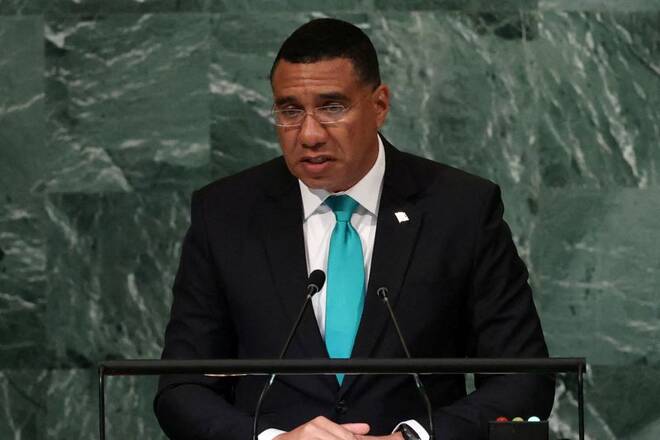Advertisement
Advertisement
Jamaica willing to take part in military intervention in Haiti, PM says
By:
KINGSTON (Reuters) - Jamaica would be willing to take part in an international military deployment to Haiti, Prime Minister Andrew Holness told lawmakers on Tuesday, saying the Caribbean island country could also support its neighbor on electoral reforms.
KINGSTON (Reuters) -Jamaica would be willing to take part in an international military deployment to Haiti, Prime Minister Andrew Holness told lawmakers on Tuesday, saying the Caribbean island country could also support its neighbor on electoral reforms.
The United Nations in October suggested a “rapid action force” be sent to Haiti, where gangs have expanded their territory after the assassination of President Jovenel Moise in 2021 left a power vacuum.
That has led to routine gun battles between police officers and the gangs, with police last week blocking streets in protest at officer deaths. Bloody turf battles between rival gangs have left hundreds dead and thousands displaced.
Haitian Prime Minister Ariel Henry has pleaded for foreign military support. The U.N. envoy to Haiti, Helen La Lime, has called for more urgency, saying the police cannot win without outside support. But talks have stalled, with most countries appearing wary of sending in troops.
“Jamaica would be willing to participate in a multinational security assistance deployment to Haiti under the appropriate jurisdictional parameters to support a return to a reasonable level of stability and peace,” Holness told lawmakers.
Both Jamaica’s police and army had been informed, he said, and would begin preparations for “such eventualities.”
Separately, El Salvador’s Vice President Felix Ulloa has offered to send a “technical team” to Haiti to offer advice in fighting gangs, a presidential adviser told Reuters. The Central American country has been engaged in a bloody crackdown against armed gangs on its own territory, which has drawn criticism from human rights groups.
Last week, Caribbean bloc CARICOM issued a statement condemning both the recent gang killings of police officers in Haiti and the police protests.
“We continue to believe that any solution must be driven by the will of the Haitian people,” Holness said. “The developments over the past week, however, demonstrate that progress on the path towards restoration of democratic institutions and the rule of law remains highly fragile.”
He pointed to “increasing reports” of children who have yet to restart their school year being recruited into gangs.
Holness added that while talks within CARICOM remain ongoing, Kingston would be prepared to host talks between Haiti’s political leaders and civil representatives.
Mark Golding, Jamaica’s opposition leader, said he would endorse Jamaica’s participation within the parameters outlined by the prime minister, noting an “alarming prospect” for Haiti’s neighbors of further deterioration.
Golding said reparations for Haiti should also be on the agenda for any talks. Following Haiti’s independence, France imposed heavy debts on its former colony for lost “property,” including slaves, that took over a century for Haiti to pay off and stymied its development.
(Reporting by Kate Chappell in Kingston, Nelson Renteria in San Salvador and Sarah Morland in Mexico City; Editing by Rosalba O’Brien)
About the Author
Reuterscontributor
Reuters, the news and media division of Thomson Reuters, is the world’s largest international multimedia news provider reaching more than one billion people every day. Reuters provides trusted business, financial, national, and international news to professionals via Thomson Reuters desktops, the world's media organizations, and directly to consumers at Reuters.com and via Reuters TV. Learn more about Thomson Reuters products:
Did you find this article useful?
Latest news and analysis
Advertisement
